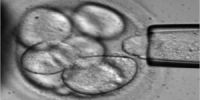Researchers Use Neural Stem Cells to Treat Type 1 Diabetes in Mice
A new study by Japanese researchers may support transplanting neural stems cells into a patient's pancreas as a viable treatment for type 1 diabetes.

A new study by Japanese researchers may support transplanting neural stems cells into a patient’s pancreas as a viable treatment for type 1 diabetes.
For some time cell transplantation has been viewed as a possible route of treatment for the condition. However, the method always involved removing healthy pancreatic tissue from one individual and transferring it to those with type 1 diabetes. Unfortunately, this method has not proven viable due to the lack of healthy pancreatic tissue available and because the body often rejects cells from foreign sources.
Using neural stem cells from the patient themselves may overcome these issues. These cells are prevalent within patient’s brains and therefore will not be rejected by the body. Once inserted into the pancreas, these stem cells often become insulin-producing beta cells.
At the AIST Institute in Tsukuba, Japan, a team of researchers tested the method using laboratory mice bred to develop deficient levels of beta cells. The team collected samples of stem cells from the mice’s hippocampus and olfactory bulb. The two locations not only allow for easy retrieval through the nasal passage, but also contain the tissue in great abundance.
The researchers reported their findings in the EMBO Molecular Medicine journal, stating that after extraction, the human protein Wnt3a was applied to the cells to “switch on” insulin production. Two weeks later, the number of cells was sufficient to lay collagen sheets covered in stem cells over the mice’s pancreases. Once the cells had been relocated they took on the characteristics of normal beta cells. After another week, the levels of insulin production and blood sugar levels matched those of healthy mice.
The researchers also noted the lack of genetic manipulation necessary in the transfer. "Our findings demonstrate the potential value of neural stem cells for treating diabetes without gene transfer," said lead researcher Tomoko Kuwabara. "This presents an original strategy to overcome the donor shortage which has hindered cell replacement therapy."
These findings could show great potential in the field of type 1 diabetes treatment. Type 1 diabetes causes the body’s immune system to destroy its own beta cells, leaving the patient to rely on injected insulin. The introduction of different cells acting as insulin producers could allow those with the condition to begin producing their own insulin again.
"The discovery of stem cells which have virtually unlimited self-renewal raises great expectations for their use in regenerative medicine. The isolation and cultivation of stem cells as a renewable source of beta cells would be a major breakthrough."
Sources: DiabetesHealth.com, Endocrineweb